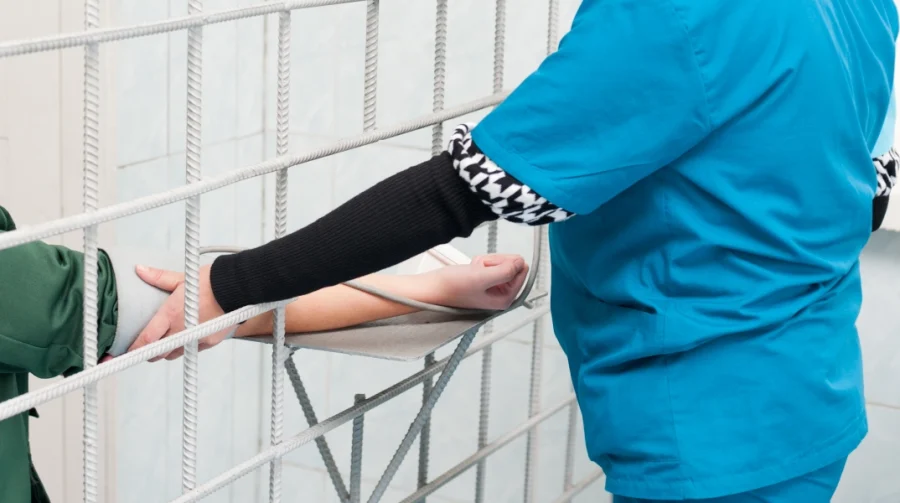18 DECEMBER 2023
#OurStories: Health Without Barriers: Access to health services for prisoners
Health Without Barriers has led the campaign for prisoners to be given unrestricted access to health services.
In 1957 the United Nations Organization established the ‘Standard Minimum Rules for the Treatment of Prisoners’ which were updated in 2015 and renamed the Nelson Mandela Rules (NMR). These include the fundamental rights of prisoners to health, to unrestricted access to diagnosis and treatment, as well as the confidentiality of their medical data. 66 years after they were instituted, are the UN rules being applied in Greek prisons?

George Kalamitsis, President of the Hellenic Liver Patients Association ‘Prometheus’, describes the situation on the ground as he has encountered it over the last seven years, since the organization first became active in prisons throughout the country. “When in 2017 we started to implement our first programme, with the aim of diagnosing prisoners and including them in the health system, we discovered that there are serious problems in this area. One of the most significant impediments to accessing health services within the prison system was the fact that a certain percentage of prisoners did not have a Social Security Number (A.M.K.A.), because they did not have the necessary legal documents. In practice this meant that a large number of prisoners couldn’t be tested or treated for hepatitis B & C, or any other health issue they might be facing. We therefore decided to work together with the ‘Positive Voice’ organization to design the ‘Health without Barriers’ programme, with the main goals of officially recording restrictions on access to health services in five detention centres and strengthening advocacy in state institutions, in order to push through a series of changes related to prisoners’ rights, such as issuing a Social Security Number to all prisoners without exception, creating an electronic health record, offering telemedicine, ensuring confidentiality, etc.”
‘Health without Barriers’ was first rolled out in April 2021, one of the 119 programmes managed by the Bodossaki Foundation, in collaboration with SolidarityNow, as Fund Operator of the Active citizens fund Greece. The Active citizens fund in Greece is supported through a € 15 m grant from Iceland, Liechtenstein and Norway as part of the EEA Grants 2014 – 2021. The programme aims to develop the sustainability and capacity of the civil society sector in Greece, and to strengthen its role in promoting and safeguarding democratic procedures, active citizenship and human rights.
The first step of the Health Without Barriers project was to collect data relating to prisoners’ access to health services. To achieve this, a scientific committee was established which created surveys to be completed by prisoners and staff in five state penitentiaries: Trikala, Chania, Malandrino, Korydallos I and Chios.
The committee is coordinated by Ms Vana Sypsa, Professor of Epidemiology and Medical Statistics at the Laboratory of Hygiene, Epidemiology and Medical Statistics of the Medical School of the University of Athens. She describes the approach in her own words: “First you collect the required data, analyse it, and set it out in a final policy brief which can assist in providing advocacy and proposing institutional changes to the competent bodies who will be addressing the causes of the problem. For the survey, besides recording the participants’ personal details, such as age, country of origin, existence of a Social Security Number, etc., we have also included templates from international organizations which are recommended for prisons, enabling us to compare the data collected with European standards, for example.”
The research sample was quite large, with a total of 479 prisoners and 85 prison officials completing the surveys. The results recorded problems encountered by prisoners wishing to access health services, as well as the treatment of infectious diseases such as Hepatitis B and C and HIV.
As Ms Sypsa stated, the survey “recorded that a large percentage of prisoners had a history of intravenous drug use, a group in which up to 80% are suffering from hepatitis C! Although the average period of detention for prisoners completing the survey was 3.3 years, which allows ample opportunity for a person with an infectious disease to be diagnosed and given appropriate treatment, this usually did not take place. The main impediment to accessing health services was the fact that 25% of the prisoners interviewed did not possess a Social Security Number or Temporary Social Security Number. Among those who were not Greek citizens, this percentage rose to almost 50%’.
Ms Ioanna Anastasopoulou, Director of Nafplion penitentiary, where the ‘Health without Barriers’ programme was implemented, confirmed the seriousness of the difficulties caused by non-possession of a Social Security Number: “As part of the initiative of the Hellenic Liver Patients’ Association ‘Prometheus’, we tested the majority of the inmates of the Nafplion penitentiary for hepatitis C. Unfortunately, of the 84 who tested positive, only 17 were eligible for treatment. Why? Because they were the only ones with the ‘lucky number’ – the Social Security Number or Temporary Social Security Number. It is deeply unfair, especially when you consider that access to health services for prisoners and non-prisoners is an inalienable universal right and not a privilege reserved for a few.”
After the research had been completed and the results processed, meetings were held with the General Secretariat of Anti-Criminal Policy at the Ministry of Citizen Protection, where the problems were set out in detail, along with possible solutions. As stated by the General Secretary, Mr. Konstantinos G. Papathanasiou, “At the prompting of Mr. Kalamitsis, President of the Hellenic Liver Patients Association ‘Prometheus’, and following communication with him, a Memorandum of Cooperation was signed in March 2021 between the General Secretariat of Anti-Criminal Policy and the Hellenic Liver Patients Association ‘Prometheus’ and HIV-positive Associations of Greece ‘Positive Voice’, with the aim of implementing the ‘Health Without Barriers’ project. The results of the research that was carried out has given us a clearer record of the data available and the attitudes of prisoners, whether sick or not, and prison officials to infectious diseases, highlighting the problems faced by sick prisoners attempting to access medical care. Finally, the proposals formulated by the programme’s implementing bodies go hand in hand with the aim already adopted by the General Secretariat, among others, to grant a temporary health care number to prisoners who do not have a Social Security Number, so they will not be prevented from accessing health services.”
The General Secretariat of Anti-Criminal Policy filed the legislative decree (Article 84 of Law 4985/2022) for the Temporary Prisoner Health Care Number (P.AY.PE.K.) and from next September it will begin to be issued in all of the country’s prisons. The beneficiaries will include both citizens and foreigners who are incarcerated in the Greek prisons, and do not possess or do not meet the conditions for being issued with a Social Security Number or Temporary Foreigner’s Insurance and Health Care Number for as long as their reservation lasts. Thus, nursing and medical care will be guaranteed for thousands of prisoners who were previously denied it.

The story “Health Without Barriers: Access to health services for prisoners” was published (in Greek) in Athens Voice.
